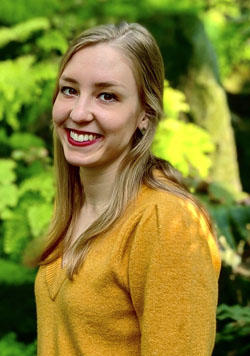
Bethany Stieve
Thesis Title:
Closed-loop neuromodulation in a mouse model of temporal lobe epilepsy
Current Position:
Postdoctoral Fellow, University of Wisconsin - Madison
Undergraduate Institution and Major:
University of Wisconsin, B.S. in Neurobiology, 2015
Graduate Advisor:
Esther Krook-Magnuson, Ph.D., Department of Neuroscience
Graduate Research:
My research aims to expand our understanding of hippocampal circuitry, especially in the context of epilepsy. Specifically, I will study how hippocampal long-range inhibitory neurons may contribute to or alleviate epileptic activity in rodent epilepsy models.
Graduate Publications:
- LINCs are vulnerable to epileptic insult and fail to provide seizure control via on-demand activation. eNeuro. 2023 Jan 30:ENEURO.0195-22.2022.
- Stieve BJ, Richner TJ, Krook-Magnuson C, Netoff TI, Krook-Magnuson E. Optimization of closed-loop electrical stimulation enables robust cerebellar-directed seizure control. Brain. 2023 Jan 5;146(1):91-108.
- Neuroligin-3 in dopaminergic circuits promotes behavioural and neurobiological adaptations to chronic morphine exposure. Addict Biol. 2023 Jan;28(1):e13247.
Graduate Abstracts:
Posters:
- Stieve BJ., Christenson Wick Z., Richner T., Netoff T., Krook-Magnuson E. Seizure-intervention via a novel hippocampal inhibitory cell population. Park City Epilepsy Meeting, October 2019.
- Stieve BJ., Christenson Wick Z,, Krook-Magnuson E. Seizure-intervention via a novel hippocampal inhibitory cell population. Gordon Research Conference: Inhibition in the CNS, July 2019.
Graduate Awards:
- UMII-MnDrive Informatics Graduate Assistantship 2020
- Park City Epilepsy Meeting Travel Award 2019
- Center for Neuroengineering Travel Award 2019
- Stark Award for Advanced Scholarship 2019
- MnDRIVE Research Fellowship in Neuromodulation 2019
- Morris Smithberg Memorial Prize 2018
Graduate Program in Neuroscience Committees:
- Curriculum and Exam committee 2018-2020
- Biomedical Research Day/Research Recognition Day Committee 2018-2019
Professional Outreach:
- Brain Awareness Week 2018
Research Categories:
- Neurodegenerative Diseases and Neural Injury
- Neuroengineering
- Neuroimaging and Optogenetics
Rotations:
Patrick Rothwell, Ph.D., Department of Neuroscience
Esther Krook-Magnuson, Ph.D., Department of Neuroscience
Matthew Johnson, Ph.D., Department of Biomedical Engineering
Ben Hayden, Ph.D., Department of Neuroscience
Thesis Committee Members:
Yasushi Nakagawa, Ph.D., Department of Neuroscience (Chair)
Esther Krook-Magnuson, Ph.D., Department of Neuroscience
Sarah Heilbronner, Ph.D., Department of Neuroscience
Tay Netoff, Ph.D., Department of Biomedical Engineering
Undergraduate Awards:
Distinctive Scholastic Achievement in the College of Agriculture and Life Sciences, 2015
Undergraduate or Post-Bac Research:
In the Department of Ophthalmology I analyzed a neuroprotective drug through in vivo and in vitro photic injury, which is a model of oxidative retinal degeneration.
More recently, in the Department of Neuroscience, I investigated the role of dopamine in motivation and reward processing. I analyzed the effects of a dopamine transporter antagonist, methylphenidate (Ritalin), through behavioral and fMRI studies.
What Got You Interested In Research?
My initial interest in neuroscience was sparked by a Ted Talk given by Vilayanur Ramachandran (3 Clues to Understanding your Brain). I was very inspired by the idea of learning as a career, and after joining my first research lab, my passion for scientific discovery continued to grow.
Why Did You Choose MN?
The Graduate Program in Neuroscience had everything I was looking for in a graduate program – world-class research with enthusiastic faculty and students, set in an exciting place to live. I was especially impressed by the vast array of research on addiction. The summer program at Itasca was a great bonus!
Student Mentor and the Best Advice They Gave:
Morgan Newhoff: She gave me tips on setting up lab rotations.
Favorite Itasca Memory.
My favorite Itasca memory was karaoke at Lobo's!
